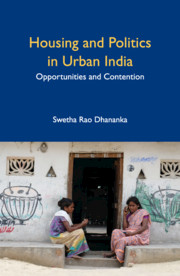Book contents
- Frontmatter
- Dedication
- Contents
- List of Figures
- List of Tables and Box
- Acknowledgements
- List of Abbreviations
- 1 Claiming Adequate Housing in Urban India: An Introduction
- 2 Indian Democracy: Normative Prescriptions and Everyday Practices
- 3 Governmentality of Housing and the Politics of Access
- 4 Mobilization on Behalf of the Urban Poor
- 5 Mobilizations by the Urban Poor
- 6 Claiming Housing despite Indian Politics and Governance
- Epilogue
- Bibliography
- Index
Epilogue
Published online by Cambridge University Press: 30 April 2020
- Frontmatter
- Dedication
- Contents
- List of Figures
- List of Tables and Box
- Acknowledgements
- List of Abbreviations
- 1 Claiming Adequate Housing in Urban India: An Introduction
- 2 Indian Democracy: Normative Prescriptions and Everyday Practices
- 3 Governmentality of Housing and the Politics of Access
- 4 Mobilization on Behalf of the Urban Poor
- 5 Mobilizations by the Urban Poor
- 6 Claiming Housing despite Indian Politics and Governance
- Epilogue
- Bibliography
- Index
Summary
During the subsequent years after this research, I landed yearly in Bangalore. Hemming the road connecting the airport to the city, a tapestry of hoardings fuel dreams of fancy homes, jewellery, and cars. Of these, one hoarding caught my attention and never left me since. Against a crude cement multi-storeyed structure and featuring a luxurious villa, it displayed, ‘The 1% Club, are you the ONE?’ That question invited passengers to project themselves as part of an exclusive club that would be constituted through extreme urban inequality. What are the embodiments of a city that lures exclusiveness and caters to the ambitions of the higher economic class? The concept of ‘worlding’ (Roy and Ong 2011) not only invokes those practices that imagine alternative elite socio-economic configurations by co-referencing to ‘modern’ cities, but is also emblematic on a larger scale of the operations to enter into global networks of capital and exchange. Roy and Ong understand worlding practices as a process of dialectic urbanism between elite aspirations from above and aspirations and mobilization of local communities from below (Teo 2014). An illustrative example of this dialectic occurred on the 2 March 2017, the day on which the civil society in Bangalore was in a jubilant mood. In a sustained collective and creative effort, citizens had campaigned and achieved to deter the state government from building a 6.9 kilometre steel flyover connecting the city centre with the airport. The steel structure would have cost the city around 270 million dollars and 2,244 old trees of 71 species (Nagendra 2017). The proposal for the metallic giant stood in direct violation of numerous Acts and in contempt of several judicial orders. These texts of law required the state to conduct public consultations at large, engage in an environmental impact assessment, put the project financing under review, and follow rules to retain green, lakes, and heritage spaces. The state bypassed all of these requirements and pushed for the construction for the mere purpose of cutting travel time to the airport by 7–15 minutes by car for the 1 per cent club of the city's 11 million population. The steel lobby was strong and the political pressures to bag a massive infrastructure project that would cross-finance upcoming assembly elections were high.
- Type
- Chapter
- Information
- Housing and Politics in Urban IndiaOpportunities and Contention, pp. 184 - 198Publisher: Cambridge University PressPrint publication year: 2020



